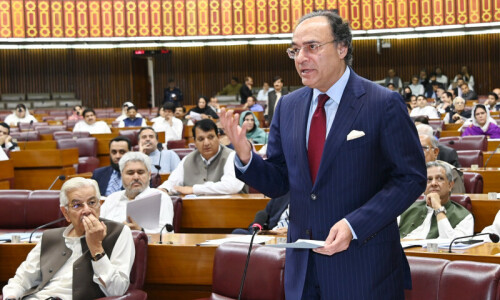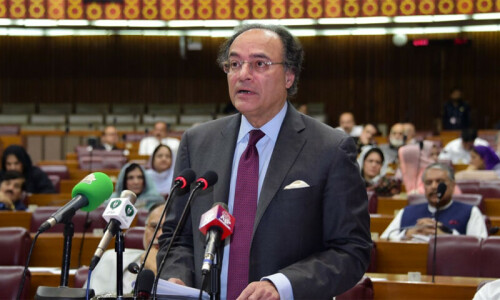
The government claims it is unable to do much to appease the business community given the current circumstances, even if it wishes to. The business community’s tough stance towards the budget was expected. Although the government asserts it is in talks with business leaders, significant revisions in fiscal policy are unlikely.
Therefore, minor adjustments to reverse or scale down certain taxation measures may occur. Fiscal space for these changes has been created by cutting Rs250 billion from the Public Sector Development Programme (PSDP). These modifications are not expected to affect the essence of the budget, which will have already been passed by the National Assembly when this story is published. The revised PSDP has been reduced to Rs1.1 trillion from the originally proposed Rs1.4tr.
The core objective of budget FY24 is to manage the country within its means, which entails containing the fiscal deficit as desired by the International Monetary Fund (IMF). To achieve this, the government has opted to mobilise higher revenues rather than reduce the size of the budget. Consequently, the size of the budget has increased by 25 per cent, rising from Rs14.4tr last year to Rs18.8tr this year. The revenue target has also been set at Rs12.9tr, which is 46pc higher than the last year.
The business community, aware of the economic challenges and the implications of IMF supervision in budget formulation, was irked by the proposed taxation steps. They consider these measures to be unfair, harsh, and potentially counterproductive, fearing they might mobilise less revenue by paralysing businesses. In response, they have opposed these measures through multiple platforms, launched media campaigns, and threatened lockdowns and street protests if the government fails to show empathy and flexibility.
‘Punjab has budgeted only 0.07pc (Rs3.75bn) and Sindh only 0.02pc (Rs6bn) of their budgets as agricultural income tax’
Finance Minister Muhammad Aurangzeb responded briefly to a query on this matter, stating, “We are constructively engaged with the industry”. However, he did not disclose the expected outcome of these ongoing interactions.
Former finance minister Miftah Ismail ruled out the possibility of a direct confrontation between businesses and the government, noting that businesses typically prefer to lobby for their demands.
Younus Dhagha, former caretaker minister in Sindh, who heads the Policy Research and Advisory Council (PRAC), supported the business community’s position. He argued that the protest is justified, as the budget makers have shown no intention of bringing ‘sacred cows’ into the tax fold.
“Placing the entire burden of new taxes on trade, industry, and the salaried class will strangulate the economy. The taxation regimes of the federation and all four provinces show no sign of taxing the agricultural elite. Punjab has budgeted only 0.07pc [Rs3.75bn] and Sindh only 0.02pc [Rs6bn] of their budgets as agricultural income tax. This undermines the finance minister’s claims of sparing no holy cows and ensuring horizontal equity in the new taxation regime,” he noted.
Ehsan Malik, CEO, the Pakistan Business Council (PBC) articulated the position mildly. “Whilst appreciating the challenges and constraints, PBC is engaging with the government to resolve the regressive measures proposed. Our advocacy focuses on the longer-term implications of the mismatch between policies intended to promote the growth of the formal sector and the short-term revenue-seeking measures that disproportionately burden this sector, discourage exports and deter investment, especially foreign direct investment (FDI),” he remarked.
Abdul Aleem, Secretary General of the Overseas Investors Chamber of Commerce and Industry (OICCI), expressed disappointment. “This year’s budget process lacked engagement with the business community, resulting in many surprises, especially for corporates. Ad hoc measures like increased taxes on salaries, arbitrary disallowance of 25pc of sales promotion and advertising expenses have led to protests from key stakeholders.”
He also mentioned the government’s failure to broaden the tax base by ignoring agriculture and trade income. “There is still an opportunity for the government to engage in dialogue to avoid protests, which could negatively impact prospects of FDI inflows,” he stated.
Planning minister Ahsan Iqbal, defended the budget by highlighting inherited challenges and the economic stabilisation efforts led by Prime Minister Shahbaz Sharif. “No party, in or out of the government, could have offered a significantly different budget. After servicing debt liabilities, the government has limited room to manoeuvre,” he said over the phone, citing projected revenue and key expenditure figures from the 2024-25 budget.
“This is not about politics; the national interest is at stake. We hope and expect the business community to endure the current tough phase with patience. I assure you that with our collective efforts, the economy will turn around,” he remarked.
Gohar Ejaz, former caretaker minister and articulate businessman, criticised the government’s sole focus on revenue generation. He advocated for belt-tightening and complete transparency in public spending. “The government has taken steps in the budget to increase taxes by 4pc of GDP to 13pc and non-tax revenue, including petroleum development levy, by 1pc to 5pc of GDP. Thus, tax and non-tax revenue total 16pc of GDP.
“However, the business community is not seeing any resolve of the government to reduce the fiscal deficit of 7pc of GDP by controlling PSDP, state-owned enterprises’ deficit, privatisation plans, or resolve to cancel independent power projects agreements for capacity payments. The business community supports the country with its best efforts but also demands reforms not restricted to taxation,” said Mr Ejaz.
Asad Ali Shah, a chartered accountant and analyst, was unconvinced by the government’s budget stance. He noted, “The increased tax rates for salaried persons, non-corporates, and exporters — from 1pc fixed tax on turnover to normal tax regime raising rates from 29 to 40pc on profits — are highly unfair and counterproductive. Major resistance from those affected wouldn’t surprise me. I urge the government to seriously reconsider these measures”.
Nasim Beg, an investment expert, did not expect a unified response from the business community. “There are several business groups, PBC, OICCI, Federation of Pakistan Chambers of Commerce & Industry, etc and textile exporters. Each is likely to act independently, not as a unified collective. Each group will balance its rightful demands with a sense of responsibility,” he argued.
Published in Dawn, The Business and Finance Weekly, July 1st, 2024















































Dear visitor, the comments section is undergoing an overhaul and will return soon.